Cable cars face hard climb to the top
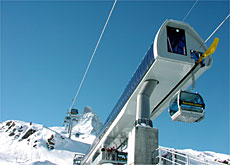
Switzerland's cable car companies are coming under increasing pressure to restructure or face financial ruin.
It is estimated that only about 30 per cent are financially healthy, with the remainder weighed down by a stagnating economy, the withdrawal of a government safety net and a lack of snow.
The companies are a key economic force in the Swiss Alps, employing 11,000 people directly. Without them, few alpine hotels or restaurants would survive.
While big has long been beautiful in the business world, the clans controlling Swiss alpine resorts have held onto their tiny fiefdoms as if they were a birthright.
In fact, many are. When the skiing boom began in the 1960s, local people and small agricultural cooperatives used savings and soft loans to construct ski lifts on their steep pastures.
This was the case in many resorts, including Zermatt, and still is in many others such as Gstaad.
Holidaymakers often travel by one company’s cable car to the top of the mountain, and ski down to a chairlift owned by another.
Restructuring
But Peter Furger, a business consultant and troubleshooter, insists Swiss cable car companies now have to “restructure to keep up with the times”.
A year ago Furger spearheaded a merger of three of Zermatt’s transport operators to form Switzerland’s largest cable car company – the Zermatt Mountain Transport Company.
In mid-December the company opened a new high-speed gondola, the eight-person “Matterhorn Express”, which climbs almost 1,000 metres in altitude and four kilometres in distance.
The lift carries skiers from Zermatt to the foot of the Matterhorn in only 12 minutes. The same trip a year ago often took an hour or more because the route was divided into two sections by old cable cars and long waiting times were not unusual.
But with a new capacity of 2,800 people per hour, queues are expected to be a thing of the past.
Merger
The Zermatt merger created a company with an annual turnover of SFr50 million, and the restructuring has freed up SFr80 million which will be invested in further technical modernisations over the next couple of years.
In contrast, 85 per cent of Switzerland’s 600 cable car companies have an annual turnover of less than SFr2 million.
The modest if not precarious financial situation of many of these companies means they have little leverage with the banks and therefore no money to replace ageing infrastructure, or to pay for artificial snow-making facilities.
And as climate change has made snowfall in the Alps unpredictable, the survival of many resorts depends on man-made snow.
Furger, who is directly involved in restructuring plans in several other top resorts including Gstaad, Crans-Montana and Leukerbad, has the support of the Swiss Cable Car Association and most recently, the Swiss economics ministry.
The ministry has put a temporary freeze on soft loans to cable car operators. Before it took its decision, financial aid was provided for all companies, regardless of their future prospects.
Many of these firms operate in low-lying areas where the snow has long ceased to fall, melting away any future as ski resorts.
Big not beautiful
But one man who believes big is not necessarily beautiful is farmer Hans Trachsel, who manages the small lift company at Elsigenalp near Adelboden in the Bernese Oberland.
Together with the tiny neighbouring resort of Metschalp, Elsigenalp has benefited from its relatively high location – with most of its 25 kilometres of runs located between 1,800 and 2,300 metres above sea level.
Compared with the high-speed lifts accessing the 400 kilometres of ski slopes in Zermatt, the few drag lifts crawling up the mountainside in Elsigenalp are indeed modest.
However, Elsigenalp is popular with locals and is an insider tip for small groups of Germans and Dutch.
Their loyalty gives Elsigenalp an annual turnover of SFr2.6 million and a cash flow of 34 per cent.
Trachsel has used company profits to dig a water reservoir as a first step towards expanding its snow-making capacity.
“We won’t continue with the expansion until we can pay for most of it ourselves,” Trachsel says proudly.
His company last requested a soft loan from the federal government in the 1980s when it constructed a 40-person gondola to transport skiers up to the resort from a car park below.
Against merger
Trachsel rejects any notion of a merger with the large resort of Adelboden only a few kilometres away, and even says joining forces financially with neighbouring Metschalp is, for the time being, out of the question.
He says he and other controlling members of the company have put their heart and soul into the business and are not willing to give that up.
“Look at the collapse of big companies, for instance Swissair or Swiss Dairy Food,” he adds. “I think small players can survive alongside the big ones.”
The Elsigenalp cable car company is a small but important employer in the Bernese Alps. The same can be said of many if not most of Switzerland’s cable car operators.
If they cease to exist, the exodus of people from alpine regions to the cities would turn from a steady flow into a flood.
swissinfo, Dale Bechtel
There are 586 cable car companies in Switzerland.
Combined annual turnover in 2001 was SFr825 million.
Only one-third are financially healthy.
A stagnating economy, government pressure and lack of snow are forcing a major restructuring of the industry.
About 85 per cent of the cable car companies have an annual turnover of less than SFr2 million, and cannot afford investments needed to modernise infrastructure.
The companies are a key economic force in the Swiss Alps. They employ 11,000 people directly, and without them, few alpine hotels or restaurants would survive.

In compliance with the JTI standards
More: SWI swissinfo.ch certified by the Journalism Trust Initiative

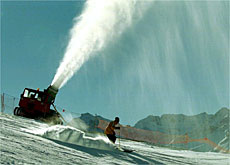
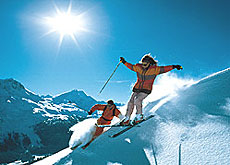
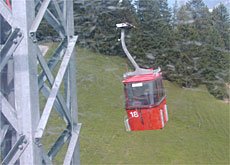
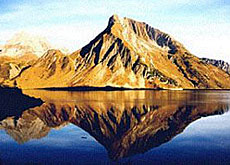
You can find an overview of ongoing debates with our journalists here. Please join us!
If you want to start a conversation about a topic raised in this article or want to report factual errors, email us at english@swissinfo.ch.